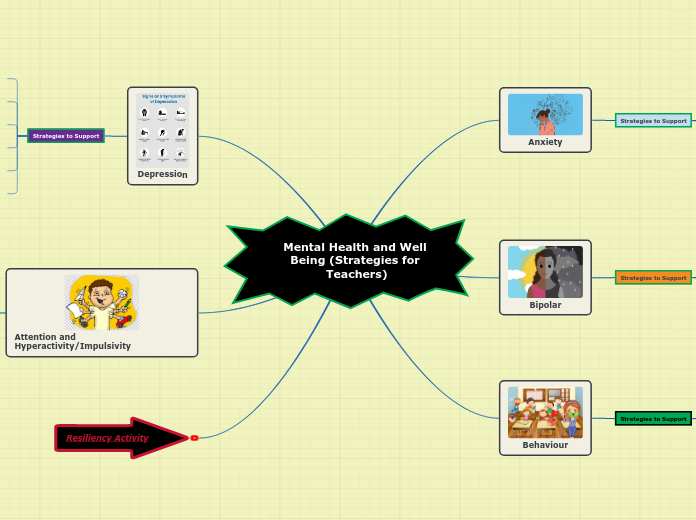Mental Health and Well Being (Strategies for Teachers)

Anxiety
Strategies to Support
-Provide predictable schedules and routines in the classroom
- Provide advance warning of any changes in routine
- Reduce schoolwork and/or homework based on information from parents and the school team about how much stress the student can manage
- Help the student break the project or large assignment into manageable chunks
- Provide a safe and quiet space for test-taking
- Develop a coping plan for unexpected events (fire drill, supply teacher)
- Daily check-ins with student to see how they are feeling

Bipolar
Strategies to Support
- Set up a procedure to allow student to exit quickly and safely from an overwhelming situation
- Allow extra time for the transition to a new activity or location
- Establish a method for regular communication between the school and parents about the expectations for the student and/or homework, weekly updates
- Check in with the student on arrival to determine how the student is feeling and provide alternatives to stressful activities on difficult days
- Provide clear, simple instructions/set goals that are attainable for the day

Behaviour
Strategies to Support
- Communicate expectations clearly and enforce them consistently
- Focus on appropriate behaviour
-Arrange a quiet, safe place where the student can go to calm down when angry
- Give positive reinforcement to the student for showing self-control in situations that would normally make him/her angry, annoyed, or upset (eg., give a tangible reward such as a classroom privilege or free time)
- Plan a full schedule of activities to avoid periods of unstructured time

Depression
Strategies to Support
- Provide students with responsibilities and tasks that they may enjoy
- Provide a space in the school for students to go when they are feeling overwhelmed
- Work with the student to develop clear expectations that they feel are reasonable.
- Help the student to set realistic goals and to monitor their progress
- Ask open-ended questions where there is no specific or correct answer
- Model and teach optimistic and positive attitudes, language, and actions

Attention and Hyperactivity/Impulsivity
Strategies to Support
- Provide a structured environment and a consistent daily routine
- Post rules/expectations where student can see them (or print out a copy for them)
- Give students an outlet for excess energy - scheduled daily physical activity, body breaks
- Chunk critical instructions, allow time for mental processing
- Use advance organizers, structured note-taking sheets, manipulatives, and visual representations
- Seat students with attention problems close to the teacher and away from distractions such as windows, doors, or other students with attention problems
- Provide activities that appeal to multiple senses
-Provide frequent short quizzes, rather than long tests at the end of a unit
